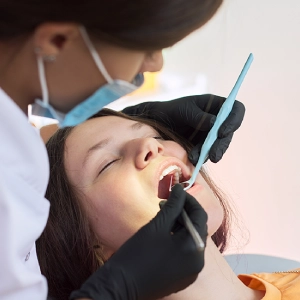Dental emergencies can happen unexpectedly, causing discomfort and anxiety. Knowing "What to do in a dental emergency?" is necessary for minimizing pain and preventing further complications.
In this blog, we'll explore essential tips and strategies for handling dental emergencies with confidence and composure. From identifying common emergencies to providing first-aid measures, we aim to equip you with the knowledge to tackle any dental emergency effectively.
How to Handle Dental Emergencies?
Here is a quick summary of what to do in a dental emergency:
Toothaches
- Start by giving yourself a warm water rinse and flossing any food particles that might have lodged in your mouth.
- Use a cold compress on the outside of your mouth or cheek if there is any swelling.
- Avoid placing aspirin or other painkillers on the gums as it may cause gum tissue irritation.
Make sure to see your dentist as soon as possible for proper evaluation and treatment.
Chipped or Broken Teeth
- Save the broken pieces and rinse your mouth with warm water, including the broken fragments.
- Apply gauze to the bleeding area for about 10 minutes or until the bleeding stops.
- Reduce swelling and relieve pain by applying a cold compress outside your mouth, cheek, or lip near the broken or chipped tooth.
It's crucial to see your dentist as soon as possible for proper evaluation and treatment.
Knocked-out Tooth
- Locate the knocked-out tooth, handle it by the crown, and rinse the root with water if it's soiled. Avoid scrubbing or removing any attached tissue.
- If feasible, attempt to reinsert the tooth, ensuring it faces the correct direction. Never force it into the socket.
- If reinsertion isn't possible, keep the tooth in your mouth or place it in milk or a cell growth medium like Save-a-Tooth.
Seek dental attention immediately.
Extruded (partially dislodged) tooth
- If you have an extruded (partially dislodged) tooth, you must see your dentist promptly.
- While on your way to the dentist, apply a cold compress on the mouth or cheek in the affected area.
- To reduce the discomfort, take an Advil or Tylenol.
Objects caught between teeth
- Cautiously remove the object stuck between the teeth using dental floss.
- Avoid using sharp objects like pins, which can cause gum cuts or tooth scratches.
Lost filling
As a temporary solution, insert a piece of sugarless gum into the cavity (avoid sugar-filled gum to prevent discomfort) or utilize over-the-counter dental cement.
Schedule an appointment with the dentist at your earliest convenience.
Lost crown
- If your crown comes off, schedule an appointment with your dentist quickly and bring the crown with you. If immediate dental care isn't available and the tooth causes discomfort, apply clove oil to the sensitive area with a cotton swab.
- Before reattaching the crown, coat the inner surface with over-the-counter dental cement, toothpaste, or denture adhesive to help secure it.
Broken braces and wires
- If a wire breaks from a bracket and causes irritation to the cheek, tongue, or gum, use the eraser end of a pencil and push the wire into a comfortable position.
- If you cannot adjust the wire, cover the broken end with orthodontic wax or a piece of cotton until you visit your orthodontist.
- Refrain from cutting the wire at home to prevent swallowing or inhaling it.
Loose brackets and bands
- Use orthodontic wax to reattach loose braces or provide cushioning over them temporarily.
- If a band is loose, save it and schedule an appointment with your orthodontist to repair or replace it, including any missing spacers.
Abscess
Abscesses are serious infections that can occur around a tooth's root or in the space between the teeth and gums. They can lead to tissue and tooth damage, with the infection spreading to other areas of the body if not treated. If you have a pimple-like swelling on your gum followed by pain, seek dental attention immediately.
In the meantime, drain pus by rinsing your mouth several times daily using a mild salt water solution (1/2 teaspoon of table salt in 8 ounces of water).
Soft-tissue injuries
Soft-tissue injuries such as those to the tongue, cheeks, gums, and lips can cause bleeding. To manage bleeding, you can:
- Rinse your mouth with a salt-water solution
- Apply a wet piece of gauze or tea bag to the bleeding area and hold for 15 to 20 minutes.
- Use a cold compress outside the mouth or cheek for 5 to 10 minutes to reduce bleeding and pain.
If bleeding continues, seek immediate dental attention or visit a hospital emergency room. Maintain pressure on the bleeding site with the gauze until you receive treatment.
Conclusion
If you have a dental emergency like the one discussed above, reach out to Sunflower Dental Spa in Rockledge, FL. Schedule your appointment online or call (321) 358-1730 for new patients and (321) 507-4408 for current patients.
FAQ
How do I recognize a dental emergency?
Not all dental issues require immediate attention. Severe pain, complete tooth loss, or mouth injuries demand immediate care. Yet, minor concerns like a lost filling or chip may wait for a scheduled dental visit. Always consult your dentist for guidance.
If my teeth are knocked out, what should I do before I go to the dentist?
If your teeth are knocked out, take these steps before seeing a dentist:
- Store teeth in milk.
- Pack the tooth socket with gauze, cotton, or a tea bag.
- Rinse and preserve any chipped or broken pieces if feasible.
What are some causes of dental emergencies?
Here are some causes of dental emergencies:
- Sports activities, bike riding, car accidents, and work-related incidents.
- Rough play at home or outdoors leads to dental injuries.
- Chipping teeth while drinking from glass bottles or eating hard foods.









